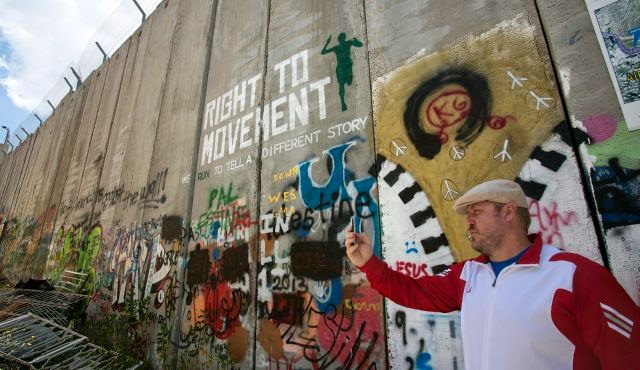Israel must engage with, not withdraw from, peace
 |
من مخيم الدهيشة قرب بيت لحم |
Israel must engage with, not withdraw from, peace
Without progress in the peace negotiations, the EU’s growing cooperation with Israel will halt and contentious and divisive issues - not least an accelerated disengagement from the settlements - will prevail.
In the aftermath of the appalling attack against the Jewish Museum in Brussels, people throughout Europe have spoken out loud and clear against terrorism in all its forms and against anti-Semitism or other expressions of racism. Such ideas are the very contrary to the European Union's core values of peace, openness, human dignity and diversity. These values are the pillars that guide our internal decisions and our external relations. These are also the values that underpin our partnership with Israel and our position on the peace process.
But the EU-Israel relationship is not just based on our shared values, fundamental though they are. There are also solid bonds of history and kinship. Europe is also part of you and of whom you are as a nation. It is on this powerful basis that we have built a dynamic relationship, economically, politically and culturally.
Our cooperation spans a vast variety of fields. The highlight is of course Israel's association to the EU's 80 billion euro Horizon 2020 research program in which Israel's outstanding researchers are expected to play a leading role. I am glad that during my visit, the EU and Israel will sign the agreement that will enable the continuation of this cooperation for the next seven years. We in Europe and Israel have much to learn and benefit from each other's culture of innovation and academic and scientific excellence. Moreover, Europe's proximity to Israel and its market of 500 million consumers makes it a natural asset for Israel's trade and innovative products.
I firmly believe that this relationship has a great potential to be developed much further, given the right circumstances. This belief was expressed by all EU Member States during the recent round of Israeli-Palestinian negotiations, notably through the offer made of a new Special Privileged Partnership to both Israel and a future Palestinian State. In the event of a final peace agreement, this foreseen partnership could prove of tremendous importance for Israel's prosperity and security. It would be a very broad framework for cooperation between Europe, Israel and a future State of Palestine, covering a multitude of policy areas, including trade, investment facilitation, infrastructure development, energy, environmental protection, culture, education and research - all areas of key importance to future generations of Israelis.
This offer opens the opportunity for Israel to make a strategic choice to associate its future even more closely to Europe. It would allow Israel to benefit from a position similar to the one enjoyed by European non-Member countries such as Norway and Switzerland! Its advantages would be truly tangible to the Israeli and Palestinian people alike - in particular to the younger generation which would be able to reap the full benefits of a new reality, freed from past conflicts and resolutely focused on a new future, solidly anchored in a common destiny with the European Union, in which peace had become irreversible. It may seem idealistic in the current context, but we need to think strategically and we all need to create the right incentives for a final settlement.
Unfortunately the peace negotiations - which could lead to this new future - are paused at the moment. The European Union hopes and has called for an early resumption of the talks. On the Israeli side, the reasons invoked for the suspension are related to the renewed Palestinian reconciliation process.
The EU believes that bringing the West Bank and Gaza back under a single authority is an important prerequisite for achieving a two-state solution. But let me also make it quite clear this reconciliation should be welcomed, as long as the new Palestinian government remains committed to the recognition of Israel's legitimate right to exist, to the principle of the two-state solution, to non-violence and to the respect of previous agreements. The EU's engagement with the new Palestinian government will be based on the latter's adherence to these policies and commitments.
The key factor at the center of this debate is, of course, the question of Israel's security. The EU has stressed on many occasions the paramount importance that it ascribes to this matter. Security and peace go hand in hand and require engagement, not withdrawal.
If no peace negotiations take place and no progress is made, the EU and Israel will have to address contentious and divisive issues, including further acceleration of the EU's policy on disengagement from the settlements. On these matters - which touch upon core values held dear throughout the EU - the Union will be compelled to act in accordance with its beliefs and its rules.
In the long term, security and prosperity can only be sustained if the right makes the might and not the other way round. There will always be those who resist peace, but for leaders on both sides, even if it may seem politically safer to keep the status quo, it is important to put the strategic interests of their countries and their people above short-term considerations. I am firmly convinced that ultimately the path of negotiations and of a two state solution is the only one that will lead to a secure and prosperous Israel. The European Union will remain strongly committed with this perspective. Leadership is about to make possible what is necessary. Peace is necessary. It is incumbent on the two sides to make it possible.
José Manuel Barroso is President of the European Commission


تعليقات